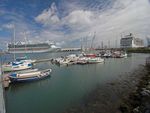The impact of BREXIT on Dublin Port - Presentation by Eamonn O'Reilly Dublin Port Company
←
→
Page content transcription
If your browser does not render page correctly, please read the page content below
The impact of BREXIT on Dublin Port
Presentation
by
Eamonn O’Reilly
Dublin Port Company
20th February 20181. What does soft and hard Brexit mean from your company’s perspective? 2. How do you think Brexit will affect your business? How could it impact on your operations? 3. What do you do to anticipate potential change in the regulatory landscape after Brexit? Do you believe you will have to restructure or change the way your company operates? 4. How does Brexit influence your business plans for the next 5-10 years and will it impact on your company’s growth projections? 5. What would your main message to the UK and EU negotiators be?
Q1. What does soft and hard Brexit mean from your company’s perspective? Dublin Port Company is taking the UK at its word
Q2. How do you think Brexit will affect your business? How could it impact on your operations?
After BREXIT, the number of non-EU freight units moving through
Dublin Port’s seven unitised freight terminals (three Lo-Lo and four
Ro-Ro) will increase more than fivefold
Non-EU EU Totals
Ro-Ro terminals (4) - 862,000 862,000
Before BREXIT
Container terminals (3) 196,000 326,000 522,000
Totals (7) 196,000 1,188,000 1,384,000
Non-EU EU Totals
Ro-Ro terminals (4) 862,000 - 862,000
After BREXIT
Container terminals (3) 196,000 326,000 522,000
Totals (7) 1,058,000 326,000 1,384,000BREXIT ports
Dublin Port will remain
the largest Ro-Ro port
in Ireland
Ro-Ro 2016 UK Europe Total
Dublin 88.8% 83.5% 88.0%
Rosslare 11.2% 16.1% 11.9%
Cork 0.0% 0.4% 0.1%
Totals 100.0% 100.0% 100.0%Shipping operators are already deploying more capacity on direct routes to Continental Europe CLdN’s Celine – 8,000 lane-metres – started October 2017 Rotterdam / Zeebrugge / Dublin
On 2nd January 2018, Irish Continental Group announces it is investing €165 million to build a
new cruise ferry for the Dublin – Holyhead route:
…it will be the largest cruise ferry in the world in terms of vehicle capacity
9Q3. What do you do to anticipate potential change in the regulatory landscape after Brexit? Do
you believe you will have to restructure or change the way your company operates?
• Dublin Port Company is an infrastructure provider
• We will provide the required infrastructure for border controls required by Irish State agencies to
met their obligations under EU legislation including the Union Customs Code
• We are relying on operators in the supply chain (ferry companies, hauliers, exporters / importers) to
make the necessary arrangements with State agencies, particularly Customs, to facilitate free
movement of goods through Dublin Port.
• We ran a Workshop on 1st February with all stakeholders and are confident that this will happen.
• We will run a second workshop in May for a progress update and a final workshop at year end to,
hopefully, confirm all arrangements for border controls (infrastructure, systems and processes) are
in place in advance of March 2019
• We see no major changes being needed in Dublin Port. The pressure for change will fall elsewhere
in the supply chain
• A new “overhead” industry will emerge in the form of customs clearance services. This is an extra
cost and an inefficiency in the supply chain and is the opposite of the benefits achieved when
barriers to trade were removed following the 1985 White Paper by Lord Cockfield on the completion
of the internal marketQ4. How does Brexit influence your business
plans for the next 5-10 years and will it
impact on your company’s growth
projections?
We will continue to expand capacity to cater for
growth. BREXIT will not change this.
Volume demand might be lower than it
otherwise would have been.
Likely to be a change from UK services to direct
services
2013 + 3.0%
2014 + 6.9%
2015 + 6.4%
2016 + 6.4%
2017 + 4.3%
2013 to 2017 +30.1%
1950 to 1980 3.2% 2.9m 7.3m
1980 to 2010 4.7% 7.3m 28.9m
2010 to 2040 3.3% 28.9m 77.2mLong-term challenges remain unaltered by BREXIT:
• Dublin Port will reach full capacity by 2040
• Key challenge is to achieve high throughputs in the four Ro-Ro terminals
• Large capital investment programme underway:
• €82m in 2017
• €132m in 2018
• €1,000m in ten years to 2027
• BREXIT is an unwelcome complication
• Dublin Port and all stakeholders are working to minimise disruptions to supply chains as a
result of BREXIT
• Dublin Port needs to squeeze as much cargo through every hectare as possible
Tonnes 2016 Land area Tonnes per
hectare p.a.
Barcelona 47.5m 1,082 ha 44,000
Rotterdam 461.2m 7,833 ha 59,000
Dublin 34.9m 309 ha 113,000Q5. What would your main message to the UK and EU negotiators be?
• Dublin Port had a large challenge to develop capacity for future growth before
BREXIT became an issue
• BREXIT is an unwelcome development but doesn’t significantly change this
challenge
• There will likely be a change in the profile of Ro-Ro services with more capacity on
direct routes to Continental Europe for two reasons:
• Diversion of UK landbridge traffic
• Underlying change in trading patterns away from UK to EU-26 countries
• The real impact of BREXIT in Ireland will be felt by specific sectors including, in the
transport sector, hauliers and, in the wider economy, agriculture and food
companies
• However unlikely it looks at the moment, keeping the UK in the Customs Union or,
even better, in the Single European Market would be a good outcome by the
negotiators
• We cannot plan on the basis of any outcome other than a hard BREXIT based on
the UK government’s clear and unequivocal statements of intent
• Our hope is that the negotiators achieve a continuity of short-sea fluidity for Ro-Ro
ferry servicesYou can also read



























































